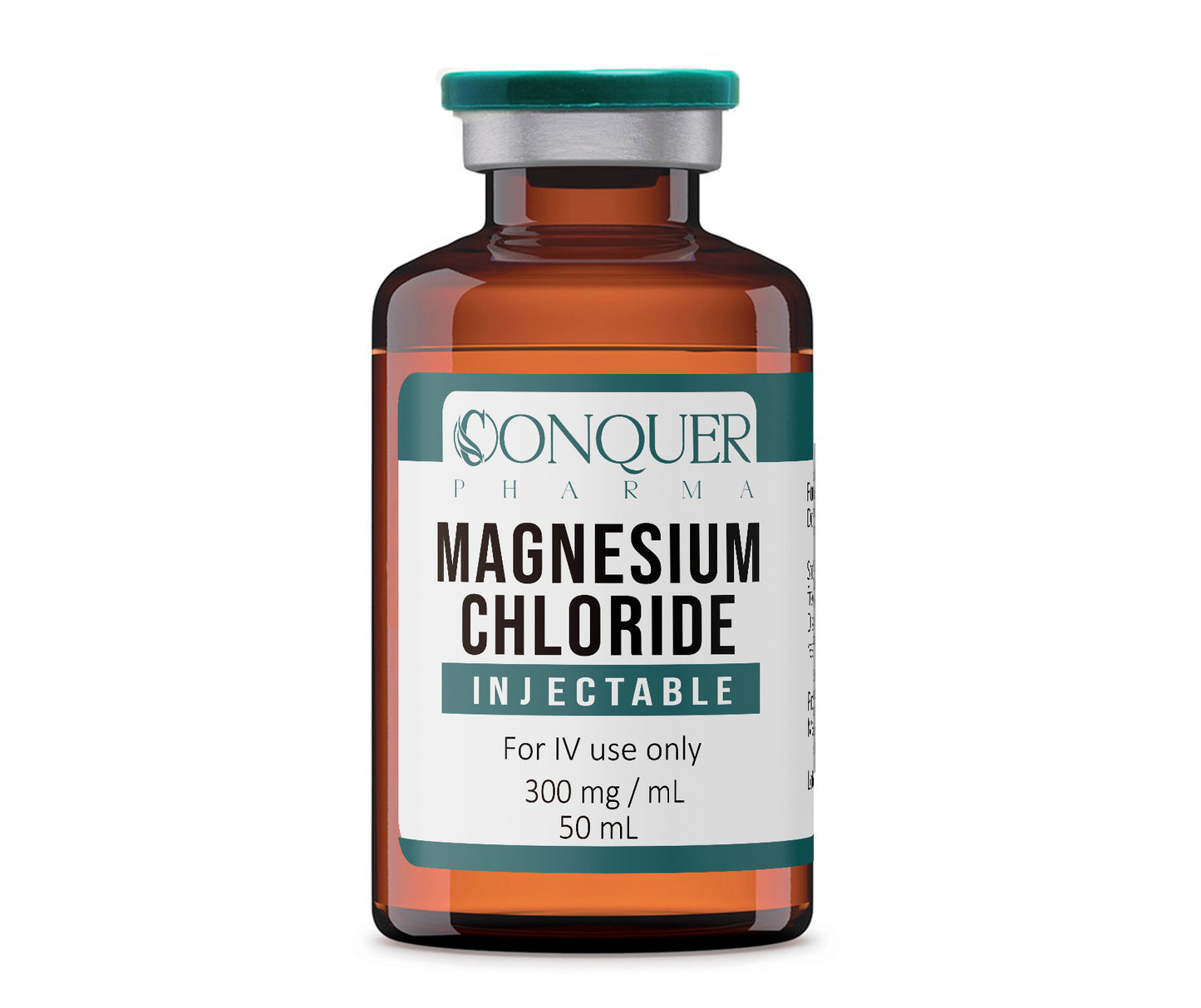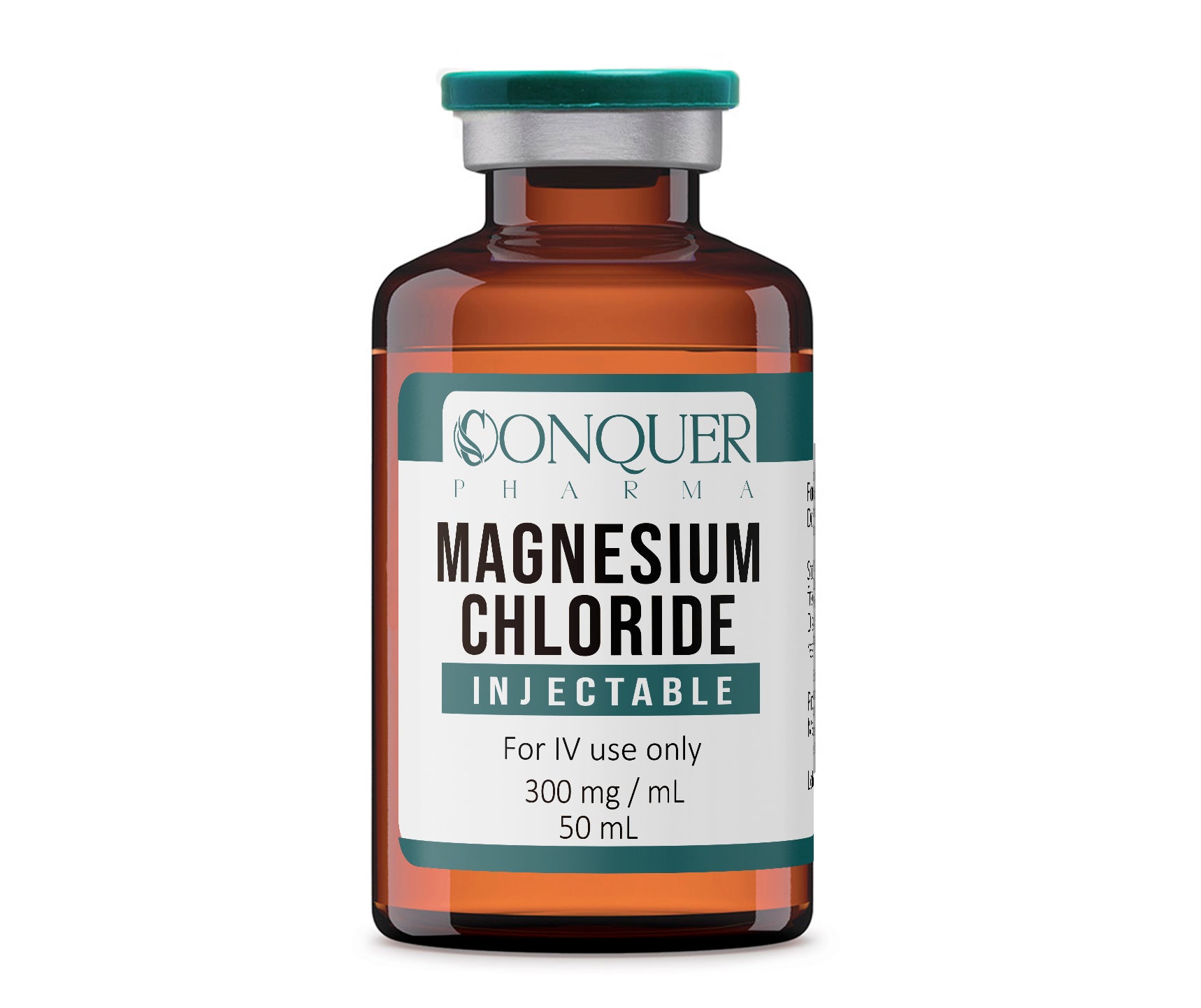My Store
Magnesium Chloride 300mg/mL 50mL Conquer Pharma Intravenous Multi-dose vial
Magnesium Chloride 300mg/mL 50mL Conquer Pharma Intravenous Multi-dose vial
Couldn't load pickup availability
Magnesium is the second most abundant intracellular cation. It is has been identified as a cofactor in more than 300 enzymatic reactions involving energy metabolism and protein and nucleic acid synthesis. Several magnesium salts are used clinically. Magnesium chloride, magnesium gluconate, magnesium lactate, and magnesium oxide are oral products used for supplementation in patients with magnesium deficiency due to malnutrition, restricted diet, or magnesium-depleting drugs. Magnesium oxide may also be used as an antacid or laxative.
Magnesium sulfate is the most commonly used of the magnesium salts and can be administered orally or parenterally. It is used orally as a laxative and parenterally as a neuromuscular depressant or to treat hypomagnesemia. Oral magnesium sulfate belongs to the class of saline laxatives, which are used primarily to empty the bowel before surgery or radiologic, proctoscopic, or sigmoidoscopic procedures. Magnesium sulfate is also a useful cathartic in combination with charcoal to treat acute drug overdose because charcoal will not bind inorganic compounds like magnesium sulfate. The primary use of parenteral magnesium sulfate is to prevent and control seizures in preeclampsia and eclampsia. Parenteral magnesium sulfate is also useful in controlling seizures due to epilepsy, glomerulonephritis, or hypothyroidism. Parenteral magnesium may also be considered in the treatment of cardiac glycoside-induced arrhythmias. Routine use of magnesium for cardiac arrest is not recommended. Magnesium may be considered for torsades de pointes (i.e., polymorphic ventricular tachycardia associated with a long QT interval).
Magnesium is a cofactor to all enzymes involved in phosphate transfer reactions that use ATP and other nucleotides as substrates. Magnesium ions are a cofactor for the normal function of the ATP-dependent sodium-potassium “pump” found in muscle membranes.5 Without magnesium, the efficiency of this pump is compromised. It is believed that hypomagnesemia is an important aspect of hypokalemia. Drugs that cause severe hypokalemia, such as cisplatin, amphotericin B, and loop diuretics, also cause hypomagnesemia. Correction of hypomagnesemia facilitates the treatment of hypokalemia by improving the pump’s ability to distribute potassium into the intracellular space. This mechanism also may explain the effectiveness of intravenous magnesium sulfate in treating cardiac glycoside-induced arrhythmias, although magnesium may exert therapeutic effects independently of a direct action on the sodium-potassium pump. It is postulated that magnesium is effective via its ability to decrease calcium uptake and decrease potassium efflux at the myocardial cell membrane. Conversely, calcium is a direct antagonist of magnesium.
Magnesium is also necessary for binding of intracellular macromolecules to organelles and mRNA to ribosomes. As a laxative, magnesium sulfate exerts its action primarily in the small intestine. The accepted mechanisms include a hyperosmotic effect from magnesium in the small intestine and stimulation of stretch receptors and peristalsis through retention of water. Other evidence indicates, however, that hyperosmolarity does not occur and that cholecystokinin release or decreased transit time are potential contributory mechanisms.
The mechanism of the antacid effects of magnesium oxide involves reaction with water. In the presence of water, magnesium oxide is converted to magnesium hydroxide which rapidly reacts with gastric acid to form water and magnesium chloride, thereby increasing gastric pH.
The role of magnesium for the treatment of severe asthma exacerbations is not clearly defined. Magnesium decreases the uptake of calcium by bronchial smooth muscle cells, which results in bronchodilation. Magnesium may also inhibit mast cell degranulation, thus decreasing inflammatory mediators such as histamine, thromboxanes, and leukotrienes. Additionally, magnesium inhibits the release of acetylcholine from motor nerve terminals and depresses the excitability of muscle fiber membranes. Magnesium also stimulates nitric oxide and prostacyclin synthesis, which may decrease asthma severity.
High magnesium serum concentrations result in vasodilation, muscle relaxation, and sedation. Some studies have shown that magnesium can prevent and reduce hypoxia-induced pulmonary hypertension, leading to its use in the treatment of persistent pulmonary hypertension of the newborn (PPHN).
As an anticonvulsant, magnesium sulfate depresses the CNS and blocks peripheral neuromuscular transmission. Depression in the CNS may be achieved through inhibition of acetylcholine release by motor nerve impulses. Magnesium is a peripheral vasodilator and an inhibitor of platelet function. Large doses can lower blood pressure and cause CNS depression.
Store this medication at 68°F to 77°F (20°C to 25°C) and away from heat, moisture and light. Keep all medicine out of the reach of children. Throw away any unused medicine after the beyond use date. Do not flush unused medications or pour down a sink or drain.
Share


